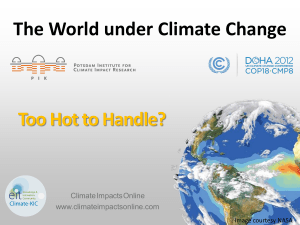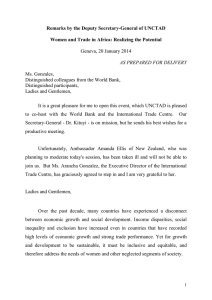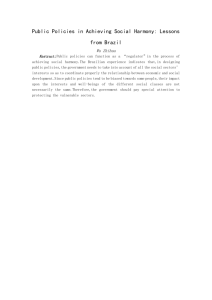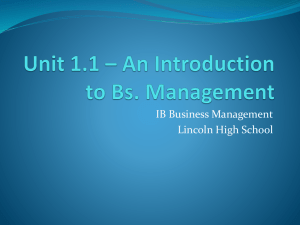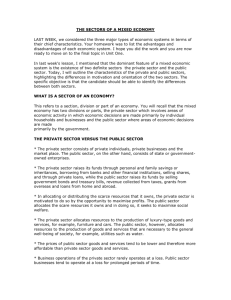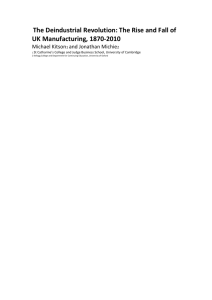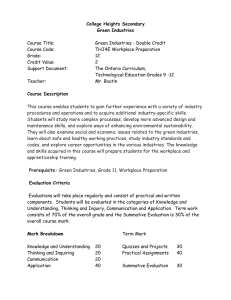CONFÉRENCE DES NATIONS UNIES SUR UNITED NATIONS CONFERENCE ON TRADE AND DEVELOPMENT
advertisement
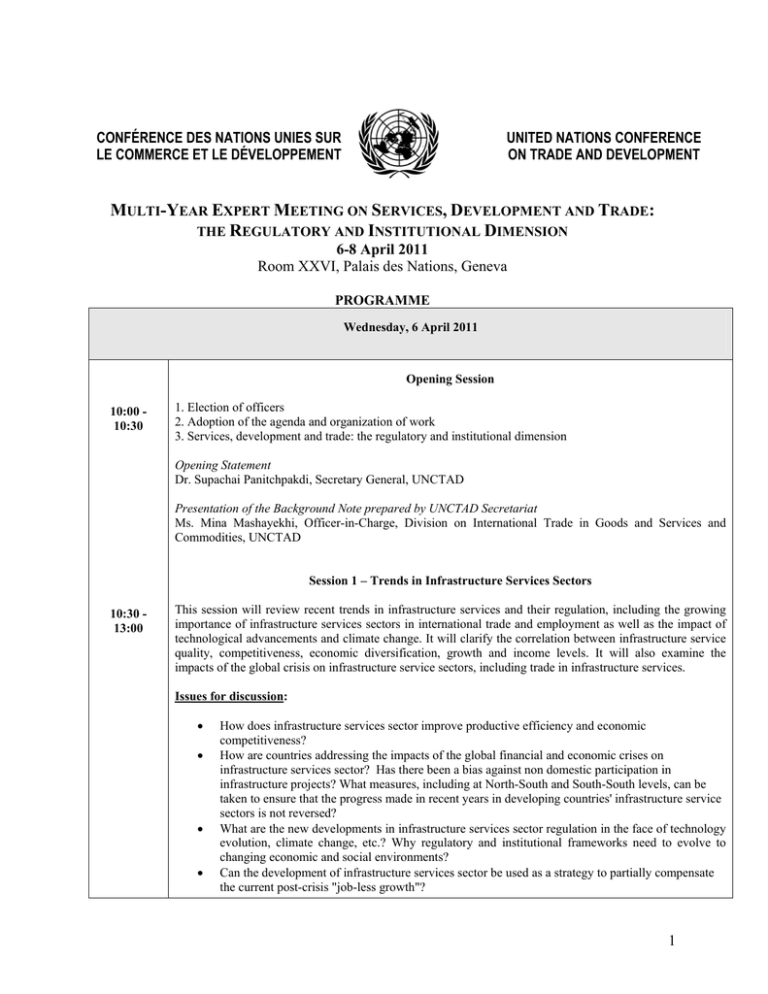
CONFÉRENCE DES NATIONS UNIES SUR LE COMMERCE ET LE DÉVELOPPEMENT UNITED NATIONS CONFERENCE ON TRADE AND DEVELOPMENT MULTI-YEAR EXPERT MEETING ON SERVICES, DEVELOPMENT AND TRADE: THE REGULATORY AND INSTITUTIONAL DIMENSION 6-8 April 2011 Room XXVI, Palais des Nations, Geneva PROGRAMME Wednesday, 6 April 2011 Opening Session 10:00 10:30 1. Election of officers 2. Adoption of the agenda and organization of work 3. Services, development and trade: the regulatory and institutional dimension Opening Statement Dr. Supachai Panitchpakdi, Secretary General, UNCTAD Presentation of the Background Note prepared by UNCTAD Secretariat Ms. Mina Mashayekhi, Officer-in-Charge, Division on International Trade in Goods and Services and Commodities, UNCTAD Session 1 – Trends in Infrastructure Services Sectors 10:30 13:00 This session will review recent trends in infrastructure services and their regulation, including the growing importance of infrastructure services sectors in international trade and employment as well as the impact of technological advancements and climate change. It will clarify the correlation between infrastructure service quality, competitiveness, economic diversification, growth and income levels. It will also examine the impacts of the global crisis on infrastructure service sectors, including trade in infrastructure services. Issues for discussion: How does infrastructure services sector improve productive efficiency and economic competitiveness? How are countries addressing the impacts of the global financial and economic crises on infrastructure services sector? Has there been a bias against non domestic participation in infrastructure projects? What measures, including at North-South and South-South levels, can be taken to ensure that the progress made in recent years in developing countries' infrastructure service sectors is not reversed? What are the new developments in infrastructure services sector regulation in the face of technology evolution, climate change, etc.? Why regulatory and institutional frameworks need to evolve to changing economic and social environments? Can the development of infrastructure services sector be used as a strategy to partially compensate the current post-crisis "job-less growth"? 1 Panelists Mr. ZHAO Houlin, Deputy Secretary General, International Telecommunications Union Dr. Y Venugopal Reddy, Emeritus Professor, University of Hyderabad and Former Governor of Reserve Bank of India/Member of the Commission of Experts of the President of the UN General Assembly on Reforms of the International Monetary and Financial System (VC) Mr. Michael Deegan, Coordinator and Head of Infrastructure Australia, Australia Mr. Moctar Toure, Président de la Commission de Régulation de l’Electricité et l’Eau, Mali Interactive debate 15:00-18:00 Session 2 - Key Policy, Regulatory and Institutional Issues in Infrastructure Service Sectors This session will address key policy, regulatory and institutional issues so as to harness the development gains from developing infrastructure service sectors. It will look at key policies (e.g. sectoral, social, trade and investment, competition, consumer protection, and environmental) that need to go hand in hand with regulatory and institutional frameworks in enabling Governments to successfully pursue multiple public policy goals, including ensuring quality, security, access, affordability and sustainability of infrastructure services sector as well as the fine balance between under and over-regulation. The available options for promoting comprehensive, integrated and coherent strategies of growth, investment, trade and regulation in the infrastructure service sectors will be examined. Issues for discussion: What are the impacts of technological advancements and evolving economic thinking on the regulatory and institutional arrangements for infrastructure services sector? What are the key characteristics of regulatory systems and institutional frameworks which have been successful in improving countries' economic competitiveness and social development? How could competition and sectoral regulatory frameworks work in coherence? How should externalities (e.g. poverty and environment), be best internalized into infrastructure regulation? What can be done to better link financial and technical assistance with the initiatives to improve the regulatory and institutional frameworks in developing countries? Panelists Mr. Mark Pearson, Deputy CEO of Regulation, Australian Competition and Consumer Protection Commission Mr. José Luis Sardón, President of the Commission for the Elimination of Bureaucratic Barriers of the Peruvian Institute for the Defence of Competition and Protection of Intellectual Property (INDECOPI) and Dean, Faculty of Law of the Peruvian University for Applied Sciences, Peru (VC) Mr. Robert N'Dekele, Cadre à l'Agence Chargée de Régulation des Télécommunications, République Centrafricaine Mr. GUO Wei, Director, Electricity Department, State Energy Bureau, China Mr. Gregory Bounds, Senior Economist, Division on Regulatory Policy, OECD 2 Interactive debate 18:15 Cocktail Thursday, 7 April 2011 10:00 13:00 Session 3 –Sectoral experiences: regulation of energy and transport This session will review how economically and socially important energy and transport services are, in particular as inputs for ensuring the competitiveness of a country's production and trade of goods and services. It will examine the various aspects relating to the regulatory and institutional frameworks in these sectors (e.g. pricing, private participation, consumer protection, competition, efficiency, universal access, environmental protection, dispute settlement and regional cooperation) with a view to identifying successful practices, in particular those that can be replicable and lessons learned. Issues for discussion: What are the pros and cons of different pricing methodologies for energy? What would be the role of new services providers in increasingly unbundled areas of electricity/energy provision and how they can be effectively regulated? How to balance the interest of energy and transport supplier with those of the industrial and household clients? How can universal access be achieved for energy and transport? What incentives should be put in place to encourage greater efficiency in energy and transport? To what extent does the use of new technology (e.g. smart grid) demand standardization and what trade implications do standards and standardization have for international trade? Can regional integration frameworks provide more effective and comprehensive responses to facilitate liberalization, harmonization and cooperation in these sectors? Panelists Dr. Pramod Deo, Chairperson, Central Electricity Regulatory Commission, India Mr. Luis Eduardo Duque Dutra, Chefe de Cabinete Do Diretor Geral, National Gás, Petroluem and Biofuel Agency, Brazil Professor Ashley Brown, Executive Director of the Harvard Electricity Policy Group, Harvard University Mr. Philippe Raillon, Chair, International Strategy Working Group, Council of European Energy Regulators Ms. Meena Naidu, Chief Policy Officer, National Transport Commission, Australia (VC) Interactive debate 15:00-18:00 Session 4 –Making the Financial Sector Serve the Development Needs This session will focus on successful experiences and lessons learned in making the financial sector serve the 3 development needs of countries, including supporting the productive activities and their competitiveness. Acknowledging the fact that national regulation and supervision is important, countries are continuing to refine and implement their regulatory responses to the financial crisis. Major economies have recently adopted new regulatory rules which aim to minimize the systemic risks of the financial sector. The overall success of these reforms will be gauged, particularly in light of their capacity to restore a functioning financial system which supports the real economy. This session will also look at the new regulatory impetus including those stemming from the Basel III rules and the work of the Financial Stability Board for the reform of financial systems at the international level. It will discuss the impacts of the new rules on the financial service sector per se and on developing countries in particular and examine whether the initiatives undertaken to date are sufficient to create a holistic and coherent international regulatory landscape. Issues for discussion: Exchange of country experiences in regulating the financial sector and managing the financial crises. In particular, what are the elements of a financial regulatory framework that supports overall national development? Are present regulatory and institutional changes at national level sufficient to avoid similar crises in the future? How to achieve the right balance between under- and over-regulation of the financial sector? What are the implications of trade agreements on financial service sector and its regulation? What are the key features of the new regulatory rules? And what are the remaining challenges in the current regulatory reforms? What will be the implications of Basel III on developing countries? Panelists Ms. DENG Yumei, Assistant Director-General, Banking Supervision Department III, China Banking Regulatory Commission Dr. Rifki Ismal, Special Assistant to Deputy Governor of the Central Bank, Indonesia Professor Kern Alexander, University of Zurich Law Faculty and the Centre for Financial Analysis and Policy, University of Cambridge Professor Michael S. Barr, University of Michigan Law School, United States (VC) Dr. Christophe Courbage, Research Director, International Association for the Study of Insurance Economics Interactive debate Friday, 8 April 2011 4 Session 5 – Trade in infrastructure services and regulatory measures 10:00-12:30 This session will examine the interface between trade in infrastructure services and regulatory measures. As infrastructure sectors are subject to relatively strong regulatory measures, either procedural or substantive, they are given special attention in trade agreements. This session will review the main trade and non trade related barriers, in particular encountered by developing countries when exporting infrastructure services and analyze the extent to which national regulatory frameworks are taken into account by trade commitments. It will also discuss how close collaboration and mutual understanding between regulators, policy makers and trade negotiators can contribute to avoiding conflicts and incoherence, and how regulatory and cooperative provisions in trade agreements could both facilitate trade and serve other wider national policy objectives relating to infrastructure services. Issues for discussion: Are regulatory and institutional issues addressed in a different manner in bilateral, regional and multilateral trade agreements? What are the possible impacts of different approaches to liberalization of infrastructural service sectors? How could regulatory cooperation in the infrastructure service sectors facilitate regional trade integration and production-capacity building in these sectors? How far have WTO Members gone in bilateral and regional services trade agreements beyond GATS in terms of regulatory provisions? What regulatory provisions could be desirable in trade agreements to increase regulatory and institutional capacity of the less developed partner(s) regarding infrastructure services? What should be done in order to make the domestic regulation disciplines under GATS development-friendly? Has mode 4 in infrastructure services benefited from trade agreements? How can mode 4 in infrastructure services be facilitated through regulatory and institutional provisions in trade agreements? Panelists Mr. Hamid Mamdouh, Director, Trade in Services division, WTO Mr. Guillermo Malpica Soto, Director General, Services Negotiations, Ministry of Economy, Mexico Mr. Frank Almeida de Sousa, First Secretary, Permanent Mission of Brazil to the WTO Mr. Vivek Sharma, Coordinator, Secretariat of East Asia and Pacific Infrastructure Regulatory Forum Interactive debate 12:30 – 13:00 Concluding Session: Way forward This session will identify areas for further work, and propose practical approaches to support countries' efforts in improving regulatory and institutional frameworks. 5
